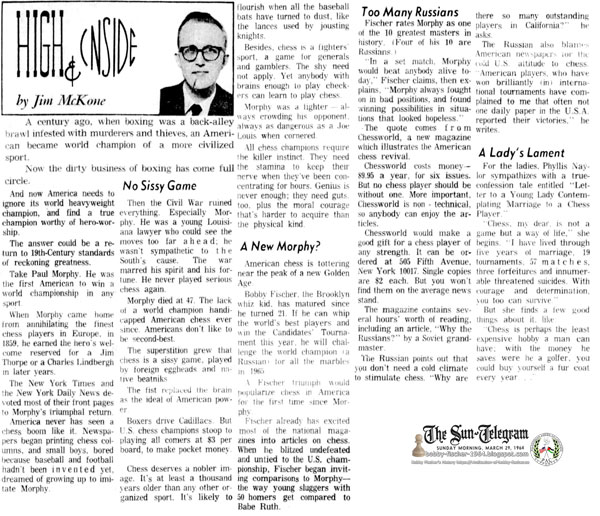The San Bernardino County Sun San Bernardino, California Sunday, March 29, 1964 - Page 25
Chessworld: Paul Morphy, Bobby Fischer and Changing American Attitudes toward Chess
A century ago, when boxing was a back-alley brawl infested with murderers and thieves, an American became world champion of a more civilized sport.
Now the dirty business of boxing has come full circle.
And now America needs to ignore its world heavyweight champion, and find a true champion worthy of hero-worship.
The answer could be a return to 19th-Century standards of reckoning greatness. Take Paul Morphy. He was the first American to win a world championship in any sport.
When Morphy came home from annihilating the finest chess players in Europe, in 1859, he earned the hero's welcome reserved for a Jim Thorpe or a Charles Lindbergh in later years.
The New York Times and the New York Daily News devoted most of their front pages to Morphy's triumphal return.
America never has seen a chess boom like it. Newspapers began printing chess columns, and small boys, bored because baseball and football hadn't been invented yet, dreamed of growing up to imitate Morphy.
No Sissy Game
Then the Civil War ruined everything. Especially Morphy. He was a young Louisiana lawyer who could see the moves too far ahead; he wasn't sympathetic to the South's cause. The war marred his spirit and his fortune. He never played serious chess again.
Morphy died at 47. The lack of a world champion handicapped American chess ever since. Americans don't like to be second-best.
The superstition grew that chess is a sissy game, played by foreign eggheads and native beatniks.
The fist replaced the brain as the ideal of American power.
Boxers drive Cadillacs. But U.S. chess champions stoop to playing all corners at $3 per board, to make pocket money.
Chess deserves a nobler image. It's at least a thousand years older than any other organized sport. It's likely to flourish when all the baseball bats have turned to dust, like the lances used by jousting knights.
Besides, chess is a fighters' sport, a game for generals and gamblers. The shy need not apply. Yet anybody with brains enough to play checkers can learn to play chess.
Morphy was a fighter — always crowding his opponent, always as dangerous as a Joe Louis when cornered.
All chess champions require the killer instinct. They need the stamina to keep their nerve when they've been concentrating for hours. Genius is never enough; they need guts, too, plus the moral courage that's harder to acquire than the physical kind.
A New Morphy?
American chess is tottering near the peak of a new Golden Age.
Bobby Fischer, the Brooklyn whiz kid, has matured since he turned 21. If he can whip the world's best players and win the Candidates' Tournament this year, he will challenge the world champion (a Russian) for all the marbles in 1965.
A Fischer triumph would popularize chess in America for the first time since Morphy.
Fischer already has excited most of the national magazines into articles on chess. When he blitzed undefeated and untied to the U.S. championship, Fischer began inviting comparisons to Morphy—the way young sluggers with 50 homers get compared to Babe Ruth.
Too Many Russians
Fischer rates Morphy as one of the 10 greatest masters in history. (Four of his 10 are Russians).
“In a set match, Morphy would beat anybody alive today,” Fischer claims, then explains, “Morphy always fought on in bad positions, and found winning possibilities in situations that looked hopeless.”
The quote comes from Chessworld, a new magazine which illustrates the American chess revival.
Chessworld costs money—$9.95 a year, for six issues. But no chess player should be without one. More important. Chessworld is non-technical, so anybody can enjoy the articles.
Chessworld would make a good gift for a chess player of any strength. It can be ordered at 505 Fifth Avenue, New York 10017. Single copies are $2 each. But you won't find them on the average news stand.
The magazine contains several hours' worth of reading, including an article, “Why the Russians?” by a Soviet grandmaster.
The Russian points out that you don't need a cold climate to stimulate chess. “Why are there so many outstanding players in California?” he asks.
The Russian also blames American newspapers for the cold U.S attitude to chess. “American players, who have won brilliantly (in) international tournaments have complained to me that often not one daily paper in the U.S.A. reported their victories,” he writes.
A Lady's Lament
For the ladies. Phyllis Naylor sympathizes with a true-confession tale entitled “Letter to a Young Lady Contemplating Marriage to a Chess Player.”
“Chess, my dear, is not a game but a way of life,” she begins. “I have lived through five years of marriage, 19 tournaments, 57 matches, three forfeitures and innumerable threatened suicides. With courage and determination, you too can survive.”
But she finds a few good things about it, like:
“Chess is perhaps the least expensive hobby a man can have; with the money he saves were he a golfer, you could buy yourself a fur coat every year…”























